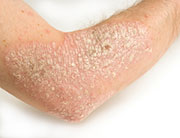
THURSDAY, Aug. 20, 2015 (HealthDay News) — People with psoriasis may be twice as likely to experience depression as those without the common skin condition, regardless of its severity, a new study suggests.
“Psoriasis in general is a pretty visible disease,” said study author Dr. Roger Ho, an assistant professor of dermatology at New York University School of Medicine in New York City. “Psoriasis patients are fearful of the public’s stigmatization of this visible disease and are worried about how people who are unfamiliar with the disease may perceive them or interact with them.”
Genetic or biologic factors may also play a role in the link between depression and psoriasis, which requires more research, he said. Either way, the findings mean that all individuals with psoriasis could benefit from screening for depression, Ho said, and their friends and family members should be aware of the connection as well.
The findings were scheduled for presentation Thursday at an American Academy of Dermatology meeting in New York City. They have not yet been published in a peer-reviewed journal and should be considered preliminary.
Most people with psoriasis have red, raised patches of skin covered with silvery-white scales, the researchers noted. These patches usually appear on the scalp, elbows, knees, lower back, hands and feet.
The researchers analyzed the responses of more than 12,000 U.S. adults in the 2009-2012 National Health and Nutrition Examination Survey conducted by the U.S. Centers for Disease Control and Prevention.
Overall, nearly 3 percent of responders reported that they had psoriasis, and about 8 percent had major depression based on their answers to a depression screening assessment. Among those with psoriasis, 16.5 percent had sufficient symptoms for a diagnosis of major depression.
Those with any degree of psoriasis had double the odds of having depression even after taking into account their age, sex, race, weight, physical activity level, alcohol use and history of heart attack, stroke, diabetes and smoking, the researchers said.
Depression is one of several concerns that someone with psoriasis should look out for, said Dr. Delphine Lee, a dermatologist at John Wayne Cancer Institute at Providence Saint John’s Health Center in Santa Monica, Calif.
“Patients with psoriasis should be aware that there are several other health issues associated with this condition, including cardiovascular and metabolic diseases, such as diabetes, as well as psychological or psychiatric disorders,” Lee said. “To address your health beyond your skin is critical to maximizing a person’s quality of life.”
Several aspects of dealing with psoriasis may contribute to depression, said Dr. Doris Day, a dermatologist at Lenox Hill Hospital in New York City.
What matters more than its severity is the location of flare-ups, she said. Some of her patients won’t wear shorts if it’s on their legs or won’t go on dates because they’re embarrassed about red spots on their skin, she added.
“Also, because it’s a chronic illness, you don’t know if it’s going to get worse and you don’t get to take a vacation from it either,” Day said. “You’re using topical treatments all year long, and as soon as you stop, it comes right back. It’s very depressing, and it can affect your self-esteem and your quality of life.”
Anxiety about how psoriasis and its treatment may affect your future health might also contribute to depression, Day explained.
“It’s unsightly, it can be itchy, people are worried about it spreading to other parts of their body, they worry about the side effects of medication, they worry about psoriatic arthritis, they worry about taking medications when they’re pregnant, and they worry about passing it along to their children,” she said.
Day recommended that people with psoriasis seek mental health treatment to get to the bottom of their depression.
“It’s about that emotional connection and finding out what about this condition is affecting someone in the way that it is,” Day explained.
Not seeking help can make matters worse, said Dr. Tien Nguyen, a dermatologist at Orange Coast Memorial Medical Center in Fountain Valley, Calif.
“Psoriasis can cause severe emotional distress,” he said, noting some patients may have suicidal thoughts or attempt suicide. “Stress is a known cause of exacerbation of psoriasis, so this will lead to a vicious cycle.”
Day added that it’s critically important to continue seeing a dermatologist to learn about new medications that become available.
“There are some really amazing new treatments that have a great safety profile that can have excellent clearance with lasting results,” Day said.
More information
For more about psoriasis, visit the U.S. National Institute of Arthritis and Musculoskeletal and Skin Diseases.
Copyright © 2026 HealthDay. All rights reserved.

